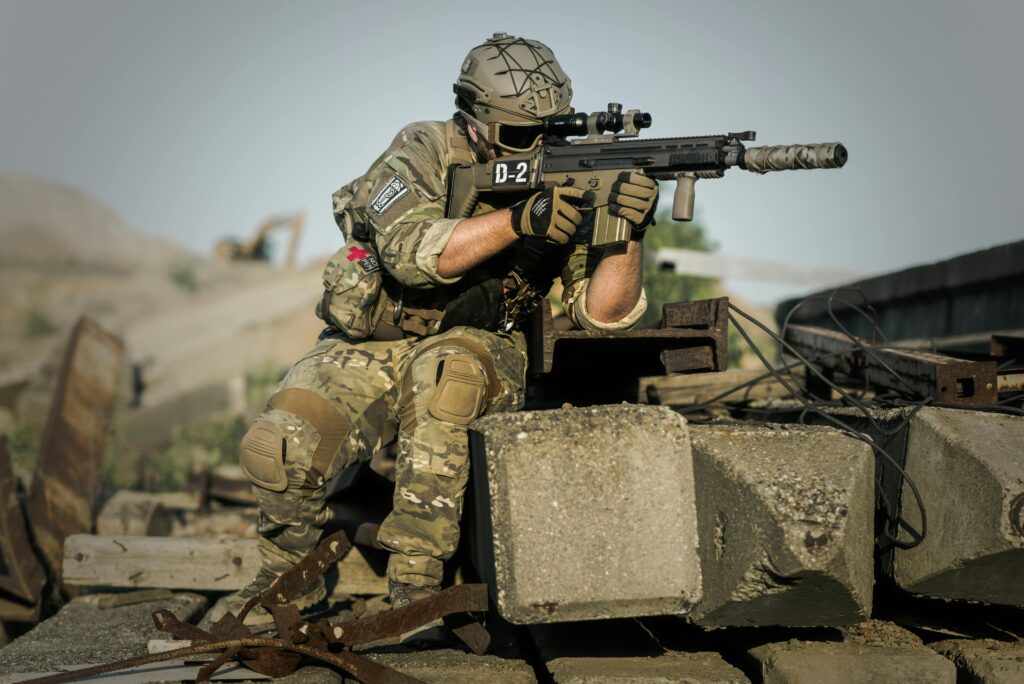Top 10 armies in the world in 2025
These rankings are based primarily on the Global Firepower Index, defense budgets, active personnel, technological advancement, and strategic reach. (The World Ranking)
| Rank | Country | Why It’s Among the Best in 2025 |
|---|---|---|
| 1 | United States | The U.S. remains top due to its massive defense budget (approx. $800–900+ billion), unmatched global reach (military bases, naval and air power), advanced technology (stealth aircraft, carriers, missile defense, cyber warfare), and large-scale R&D. (The Economic Times) |
| 2 | Russia | Despite economic and geopolitical challenges, Russia retains a very large military force, substantial numbers of tanks, strong nuclear arsenal, and experience from ongoing conflicts. Its regional power and ability to project force remain significant. (Vanguard News) |
| 3 | China | China is tied with Russia in many rankings. Its strengths include very large active personnel, rapid modernization, expanding navy (blue-water capability), hypersonic missiles, growing drone and electronic warfare capacity, and strong industrial base. (Forbes India) |
| 4 | India | India has risen sharply, boosted by its large manpower reserves, increasing defense budget, domestic defense manufacturing efforts, nuclear capabilities, and strategic positioning. It is also expanding naval and air power. (The Economic Times) |
| 5 | South Korea | South Korea ranks high due to strong technology integration, powerful air force, advanced missile defense (including systems to counter North Korea), substantial naval power, and strong alliances (especially with the U.S.). (The World Ranking) |
| 6 | United Kingdom | The UK maintains a high ranking because of its advanced naval power, nuclear deterrent, modern air force, strategic alliances, and ability to participate globally (e.g., NATO operations). Its defense technology and logistics are strong. (The World Ranking) |
| 7 | Japan | Japan’s strengths are in technology, strong defense industry, advanced air and maritime capabilities, and increasing focus on deterrence. Its self-defense forces are well-equipped and increasingly integrated with other regional powers. (Vanguard News) |
| 8 | France | France is consistently among the top due to its permanent seat on the UN Security Council, nuclear force, modern air and naval assets, and strong expeditionary capabilities. It is also active internationally in peacekeeping and military cooperation. (The World Ranking) |
| 9 | Türkiye | Türkiye has improved its military strength with investments in production (locally built weapons, drones, etc.), sizable active forces, geographic strategic location (bridging Europe and Asia), and experience in various regional conflicts. (Vanguard News) |
| 10 | Italy | Italy completes the top 10 thanks to stable defense capabilities, modern military assets, membership in NATO, and capability to project force regionally. Though not as large as top five, its quality of training, equipment, and alliances help it maintain position. (The World Ranking) |
What Makes These Armies Stand Out in 2025
Below are the main reasons all of these armies are among the best in the world right now:
- Defense Budget & Investment
Nations at the top are investing heavily in defense. Big budgets allow acquisition of advanced hardware (stealth aircraft, naval ships, modern tanks), research in new warfare domains (cyber, space, AI), and maintaining readiness. (The Economic Times) - Technology & Modernization
It isn’t just about manpower. Advanced sensors, drones, missile systems, electronic warfare, AI, cybersecurity, and precision weapons are critical. Countries that invest in these gain disproportionate advantage. (Vanguard News) - Manpower & Reserve Forces
Having large active force plus reserves provides depth. In many of the top ranked countries, the reserve or paramilitary components are also well-structured, allowing rapid scaling when needed. (The Indian Express) - Strategic Global Reach
Ability to deploy forces abroad, maintain overseas bases or allies, naval fleet that can project power, airlift capability, and logistic chains that support long operations — these matter. The U.S., for example, benefits greatly here. (All Information) - Nuclear & Deterrence Capabilities
For several of these countries, having a credible nuclear deterrent or second-strike capability adds to strategic weight. It changes the calculation for adversaries. (Forbes India) - Industrial Base & Local Production
The ability to produce your own weapons, rebuild losses, manufacture spare parts, maintain platforms in sustained use is key. Countries with strong defense industries (U.S., China, India, Russia, South Korea, etc.) are more resilient. (All Information) - Alliances & Diplomatic Influence
Being part of formal military alliances (NATO, bilateral treaties) or having strong diplomatic ties bolsters access to intelligence, shared tech, mutual defense, and collective deterrence. (The World Ranking)
Challenges and What to Watch
While these armies are leaders, they also face challenges that may affect their future rankings:
- Rising costs of maintenance and modernization
- Logistical and supply chain issues
- Recruitment, training, and retention of skilled forces
- Rapid pace of technological change (cyber threats, autonomous weapons, AI)
- Political, economic instability
